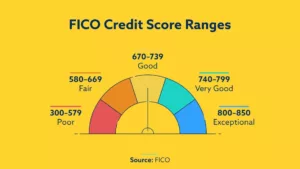I believe love conquers a multitude of things – even bad credit. But you have to be smart about it. If your mate has bad credit, by all means go ahead and get married BUT KEEP YOUR FINANCES SEPARATE. At least until you and your sweetheart work on improving their credit scores.
It’s essential for couples to be supportive to find solutions to financial challenges as a team. Discussing finances should occur some time during the courtship. In fact there’s a new dating app that requires good credit scores to use.
Look at the issue as an opportunity to work together on financial planning, budgeting, and improving credit scores.
What to do when your spouse has bad credit?
1. Find out what caused the bad credit
Are there any underlying issues like debt, job loss, or medical bills? Understanding the root cause helps create a targeted plan.
2. Pull credit reports
Get free credit reports from all three bureaus (Experian, TransUnion, and Equifax) for both yourself and your spouse. Review them for accuracy and identify any errors that need dispute resolution.
3. Authorized user
Add your spouse as an authorized user on your credit card with good standing. This allows them to piggyback on your positive credit history, but be responsible for managing their use. To get the best mileage out of an authorized user card, payment history must be excellent and credit utilization kept ten percent or lower. If both you and your partner can use a boost in scores, consider aged authorized user tradelines.
4. Get your spouse a secured credit card
Encourage your spouse to get a secured credit card. The process of improving credit involves several strategies. One might be to pay down debt as lower debt owed on revolving accounts can mean higher credit scores. Another strategy may call for getting new credit in order to show how well you manage credit.
A secured credit card reports to the credit bureaus and with on-time payments can help build credit.
5. Stay away from joint credit until your spouse’s scores improve
Credit reports do not have a specific category or designation for marital status. Your credit report primarily contains information related to your credit history, including details about your credit accounts, payment history and outstanding balances.
Your credit reports are not merged once you get married and are not updated to reflect that you’re married.
Women who choose to change their names will have their new name listed as an alias. Each individual’s credit history will contain only the information that is reported in their name.
How new married couples should handle joint credit
Your spouse’s past credit history has no impact on your credit profile until you open a joint account. After you get married there is no rule that requires married couples to apply for credit jointly.
How joint credit works
When you apply for credit jointly, both parties are responsible for the payment and the account will be reported in both of your credit reports. If one person forgets to pay the bill or the account goes into default, both parties will suffer from the negative credit impact.
Factors married couples should consider before applying for joint credit?
- Financial communication. Do you have open and honest conversations about money?
- Spending habits. Are your spending habits aligned?
- Financial goals. Do you have shared financial goals and long-term plans?
- Credit scores. Will joint credit benefit both partners based on individual scores?
- Emergency planning. What happens if one partner loses their job or faces financial hardship?
Pros of joint credit
- Increased access to credit. Combining incomes and credit scores can qualify you for higher credit limits or better interest rates on things like mortgages or car loans.
- Building credit together. Both partners can benefit from responsible use of a joint account, especially if one has a limited credit history.
- Shared responsibility. Sharing financial burdens for large purchases like furniture or appliances can be helpful.
- Convenience. One account simplifies budgeting and tracking joint expenses.
- Rewards and benefits. Joint cards often offer travel rewards, cashback, or other perks.
Cons of joint credit
- Shared liability. Both partners are equally responsible for the debt, even if one spends more.
- Credit score impact. One partner’s financial mistakes can negatively impact the other’s credit score.
- Loss of financial independence. Joint accounts require transparency and compromise, potentially limiting individual spending freedom.
- Potential for conflict. Mismatched spending habits or financial priorities can lead to arguments and stress.
- Difficulties separating finances. If the relationship ends, disentangling joint accounts can be complex and messy.
How to manage getting a mortgage to purchase a home
When you’re planning a major purchase and both incomes are needed in order to qualify; it’s best to work together to rebuild credit first.
If you don’t get your spouse’s credit file ready for a mortgage, their bad credit history will impact your mortgage rates. There are some options for couples with bad credit to purchase a home, for example:
NACA may be available in your state that look beyond credit scores to approve home buyers.
FHA mortgage loans are crucial for individuals with bad credit seeking homeownership for several reasons:
- Lower Credit Score Requirements. Compared to conventional loans, which typically require a credit score of 620 or higher, FHA loans allow for lower scores. You can qualify for an FHA loan with a credit score as low as 580 with a 3.5% down payment, or even 500 with a 10% down payment. This opens up the possibility of homeownership for those who might be excluded from traditional loan options due to past financial missteps.
- Lower Down Payment. As mentioned above, FHA loans allow for significantly lower down payments compared to conventional loans, which typically require at least 20%. This makes homeownership more attainable for individuals with limited savings or financial resources. The minimum down payment for an FHA loan is 3.5%, and some lenders may offer options as low as 1% depending on your specific circumstances.
- More Lenient Eligibility. FHA loans consider factors beyond just your credit score. They assess your debt-to-income ratio, employment history, and overall financial stability. This means that even if your credit score isn’t perfect, you may still qualify for an FHA loan if you demonstrate responsible financial management in other areas.
- Mortgage Insurance Flexibility. Unlike conventional loans with private mortgage insurance (PMI), FHA loans require mortgage insurance premiums (MIP) regardless of your down payment. However, FHA MIP is generally cheaper than PMI, especially for borrowers with lower credit scores. Additionally, you can cancel the FHA MIP after 11 years if you have a 20% equity stake in your home.
- Government Backing. FHA loans are insured by the Federal Housing Administration, which reduces the risk for lenders and allows them to offer more favorable terms to borrowers with less-than-perfect credit. This government backing plays a significant role in making these loans more accessible and affordable.
It’s important to note that FHA loans do come with higher interest rates than conventional loans, especially for borrowers with lower credit scores. FHA loans also require mortgage insurance which adds to the cost of the loan.
However, for married couples with bad credit who dream of homeownership, FHA loans offer a valuable pathway to achieve that goal. They provide more attainable credit score requirements, lower down payment options, and government backing, making them a crucial tool for expanding access to homeownership.
Final thoughts
A bad credit score is not a total deal breaker for couples. You have to know how to work around it and keep your credit separate until your sweetheart’s credit is healthy.


















